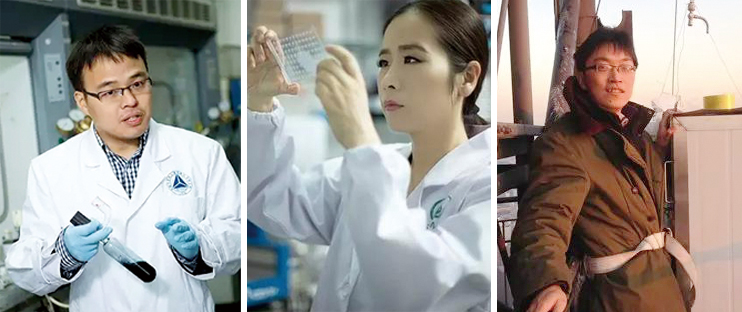
Three researchers from CAS bagged the 2018 Tan Kah Kee Young Scientist Award (from left): Dr. HUANG Zheng from the Shanghai Institute of Organic Chemistry, Dr. WU Beili from the Shanghai Institute of Materia Medica, and Dr. SUN Yele from the Institute of Atmospheric Physics in Beijin.
This year’s Tan Kah Kee Young Scientist Award goes to a total of six researchers, as announced by the Tan Kah Kee Science Award Foundation in Beijing on May 30, three of whom are from CAS: Dr. HUANG Zheng from the Shanghai Institute of Organic Chemistry, Dr. WU Beili from the Shanghai Institute of Materia Medica, and Dr. SUN Yele from the Institute of Atmospheric Physics.
Dr. HUANG Zheng, recipient of the 2018 Tan Kah Kee Young Scientist Award for Chemistry, focuses on the research of organometallic chemistry and homogeneous catalysis. His team has developed several catalytic processes for efficient conversion of low-cost alkanes to value-added chemicals, and for polyethylene degradation to diesel fuel. He has published more than 40 peer-reviewed papers in high-impact journals, including Nature, Science, and Nature Chemistry. His research was supported by the Thousand Young Talents Program and the National Science Grant for Outstanding Young Scholars. He is also the recipient of the Chinese Chemical Society-Evonik Innovation in Chemistry-Distinguished Young Scientist Award, the Chinese Chemical Society-China Homogeneous Catalysis Young Investigator Award, and the Distinguished Young Talent for Innovation in Science and Technology Award (Shanghai Branch, Chinese Academy of Science).
Dr. WU Beili, who bagged the 2018 Tan Kah Kee Young Scientist Award for Life Sciences, is a principal investigator at the Shanghai Institute of Materia Medica (SIMM), Chinese Academy of Sciences. She earned her PhD in biophysics from Tsinghua University in 2006, and did her postdoc at the Scripps Research Institute in La Jolla, California from 2007 to 2011. She was recruited by the Hundred Talent Program and started her own research group at SIMM in 2011. Her research focuses on the structural basis of G protein-coupled receptor (GPCR) signaling transduction and the development of new therapeutics for severe human diseases. Her lab has solved high-resolution crystal structures of six GPCRs. These structures reveal binding modes between different receptors and their selective ligands, and provide insights into the molecular mechanisms of GPCR signal recognition and modulation. The findings have improved our understanding of GPCR signal transduction and will facilitate drug development for the treatment of HIV infection, thrombosis and diabetes. In the past five years, Dr. WU published eight papers in Science, Nature and Cell. She has received numerous awards, including the Outstanding Young Female Scientist Award in China, Tanjiazhen Life Science Innovation Award, and ShuLan Young Scientist Award in Medical Science.
Dr. SUN Yele, winner of 2018 Tan Kah Kee Young Scientist Award for Earth Sciences, is a researcher at the Institute of Atmospheric Physics and associate director of the State Key Laboratory of Atmospheric Physics and Atmospheric Chemistry. His research mainly focuses on the characterization of the composition, sources, and formation mechanisms of atmospheric aerosols. He is also studying the interactions between boundary layer dynamics and air pollution. He is author and co-author of more than 130 SCI papers. He was recruited via the Thousand Young Talent Program, and has been awarded the Young Scientist Award of Chinese Academy of Sciences and the National Natural Science Award (second class), among others. Dr. SUN received his PhD degree from Beijing Normal University in 2006 and did his postdoctoral research at the State University of New York, University of California at Davis, and Colorado State University.

